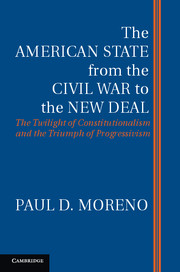 The American State from the Civil War to the New Deal
The American State from the Civil War to the New Deal Book contents
- Frontmatter
- Contents
- Abbreviations Used in the Footnotes
- Acknowledgments
- Introduction
- Part I The Old Regime
- Part II Early Progressivism
- Part III Late Progressivism
- 11 Wilsonian Progressivism
- 12 The New Freedom
- 13 The New Wilson
- 14 The Great War
- 15 The Return of the Regular Republicans
- 16 The Taft Court
- 17 The Last Progressive
- Part IV The New Deal
- Appendix A
- Appendix B
- Primary Sources
- Index
- References
17 - The Last Progressive
Published online by Cambridge University Press: 05 May 2013
- Frontmatter
- Contents
- Abbreviations Used in the Footnotes
- Acknowledgments
- Introduction
- Part I The Old Regime
- Part II Early Progressivism
- Part III Late Progressivism
- 11 Wilsonian Progressivism
- 12 The New Freedom
- 13 The New Wilson
- 14 The Great War
- 15 The Return of the Regular Republicans
- 16 The Taft Court
- 17 The Last Progressive
- Part IV The New Deal
- Appendix A
- Appendix B
- Primary Sources
- Index
- References
Summary
CORPORATISM
Of all the fables of the progressive historians, that of Herbert Hoover as the last of the laissez-faire liberals is among the most incredible. In fact, Hoover was the most progressive presidential candidate of the 1920s, whom his erstwhile supporters disowned. He was precisely the sort of technocratic administrator that progressives extolled. Hoover was personally extra-political, so that Democrats tried to enlist him as their presidential candidate in 1920. He had the support of Louis D. Brandeis, Franklin D. Roosevelt, and the New Republic. Hoover had contributed to Theodore Roosevelt’s 1912 campaign and served in the Wilson administration. The presidency was his first elective office. His principal program both as Secretary of Commerce and President was the promotion of “voluntary association.” “American individualism,” as Hoover called it, was “progressive individualism,” repudiating the “every man for himself and let the devil take the hindmost” view of laissez-faire capitalism, and also the bureaucratic regimentation of fascism or socialism. He promoted trade associations to aid “sick industries” such as lumber, coal, and agriculture, but also to promote fledgling ones such as aviation, radio, and motion pictures. He triumphed over the Justice Department when the Supreme Court reversed itself and took a more tolerant view of trade associations that went to the brink of price-fixing.
- Type
- Chapter
- Information
- The American State from the Civil War to the New DealThe Twilight of Constitutionalism and the Triumph of Progressivism, pp. 210 - 228Publisher: Cambridge University PressPrint publication year: 2013


